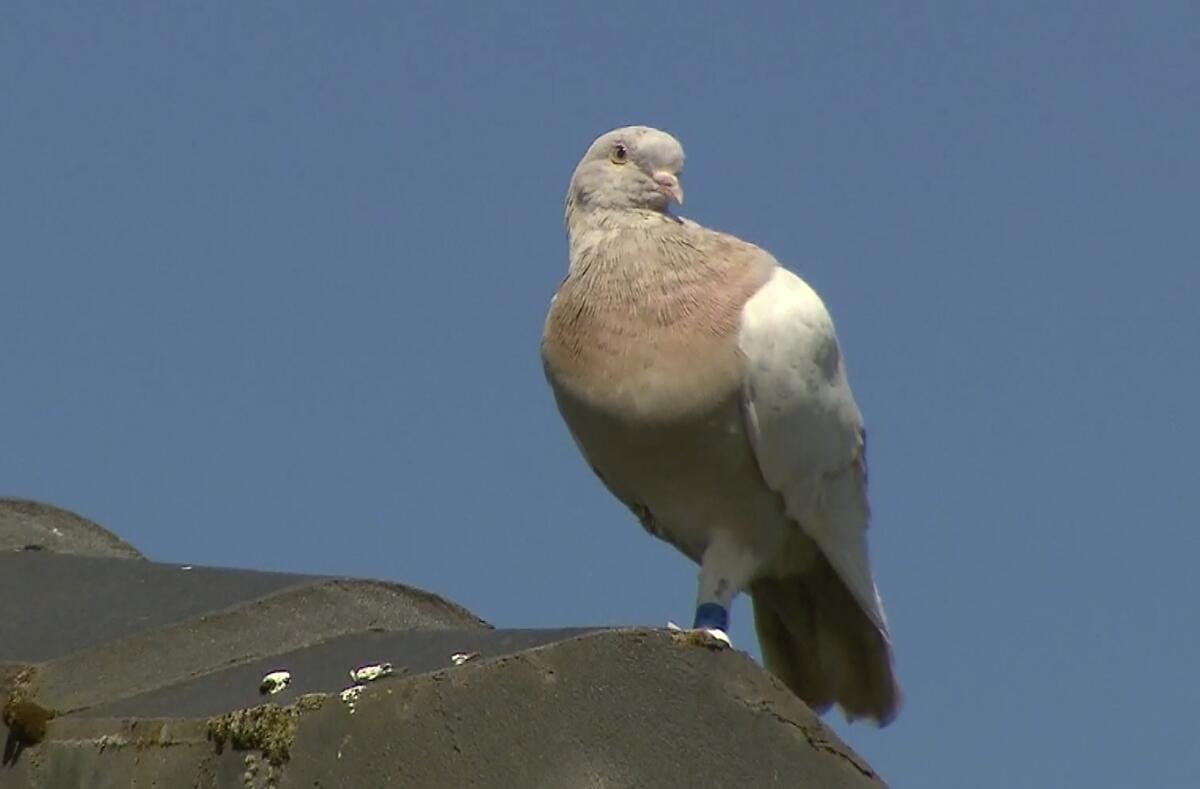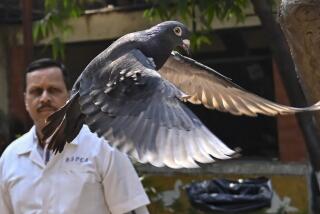Fake U.S. leg band may save pigeon from execution in Australia

- Share via
CANBERRA, Australia — A pigeon that Australia declared a biosecurity risk may get a reprieve after a U.S. bird organization declared its identifying leg band was fake.
The band suggested the bird found in a Melbourne backyard on Dec. 26 was a racing pigeon that had left the U.S. state of Oregon, 8,000 miles away, two months earlier.
On that basis, Australian authorities on Thursday said they considered the bird a disease risk and planned to kill it.
But Deone Roberts, sport development manager for the Oklahoma-based American Racing Pigeon Union, said on Friday the band was fake.
The band number belongs to a blue bar pigeon in the United States and that is not the bird pictured in Australia, she said.
“The bird band in Australia is counterfeit and not traceable,” Roberts said. “It definitely has a home in Australia and not the U.S.”
“Somebody needs to look at that band and then understand that the bird is not from the U.S. They do not need to kill him,” she added.
Counterfeiting bird bands is “happening more and more,” Roberts said. “People coming into the hobby unknowingly buy that.”
“If Joe has come in a way that has not met our strict biosecurity measures, then bad luck Joe, either fly home or face the consequences.”
— Michael McCormack, acting Australian prime minister
Pigeon racing has seen a resurgence in popularity, and some birds have become quite valuable. A Chinese pigeon racing fan put down a record price of $1.9 million in November for a Belgian-bred pigeon.
Acting Australian Prime Minister Michael McCormack said he did not know what the fate of the bird named Joe, after the U.S. president-elect, would be. But there would be no mercy if the pigeon were from the United States.
“If Joe has come in a way that has not met our strict biosecurity measures, then bad luck Joe, either fly home or face the consequences,” McCormack told reporters.
But Martin Foley, health minister for Victoria state where Joe lives, called for the federal government to spare the bird.
“I would urge the Commonwealth’s quarantine officials to show a little bit of compassion,” Foley said.
Andy Meddick, a Victorian lawmaker for the minor Animal Justice Party, called for a “pigeon pardon for Joe.”
“Should the federal government allow Joe to live, I am happy to seek assurances that he is not a flight risk,” Meddick said.
Melbourne resident Kevin Celli-Bird, who found the emaciated bird in his backyard, was surprised by the development and pleased that the bird he had named Joe might not be destroyed.
“Yeah, I’m happy about that,” Celli-Bird said, referring to news that Joe probably is not a biosecurity threat.
Celli-Bird had contacted the American Racing Pigeon Union to find the bird’s owner based on the number on the leg band. The bands have both a number and a symbol, but Celli-Bird didn’t remember the symbol and said he can no longer catch the bird since it has recovered from its initial weakness.
The bird with the genuine leg band had disappeared from a 350-mile race in Oregon on Oct. 29, Crooked River Challenge owner Lucas Cramer said.
That bird did not have a racing record that would make it valuable enough to steal its identity, he said.
“That bird didn’t finish the race series, it didn’t make any money and so it’s worthless, really,” Cramer said.
He said it was possible a pigeon could cross the Pacific on a ship from Oregon to Australia.
“It does happen. We get birds in the United States that come from Japan,” Cramer said. “In reality, it could potentially happen, but this isn’t the same pigeon. It’s not even a racing pigeon.”
The bird spends every day in the backyard, sometimes with a native dove on a pergola. Celli-Bird has been feeding it pigeon food from within days of its arrival. “I think that he just decided that since I’ve given him some food and he’s got a spot to drink, that’s home,” he said.
Lars Scott, a carer at Pigeon Rescue Melbourne, a bird welfare group, said pigeons with American leg bans were not uncommon around the city. A number of Melbourne breeders bought them online and used them for their own record-keeping, Scott said.
Australian quarantine authorities are notoriously strict. In 2015, the government threatened to euthanize two Yorkshire terriers, Pistol and Boo, after they were smuggled into the country by Hollywood star Johnny Depp and his ex-wife Amber Heard.
Faced with a 50-hour deadline to leave Australia, the dogs made it out in a chartered jet.
More to Read
Sign up for Essential California
The most important California stories and recommendations in your inbox every morning.
You may occasionally receive promotional content from the Los Angeles Times.










